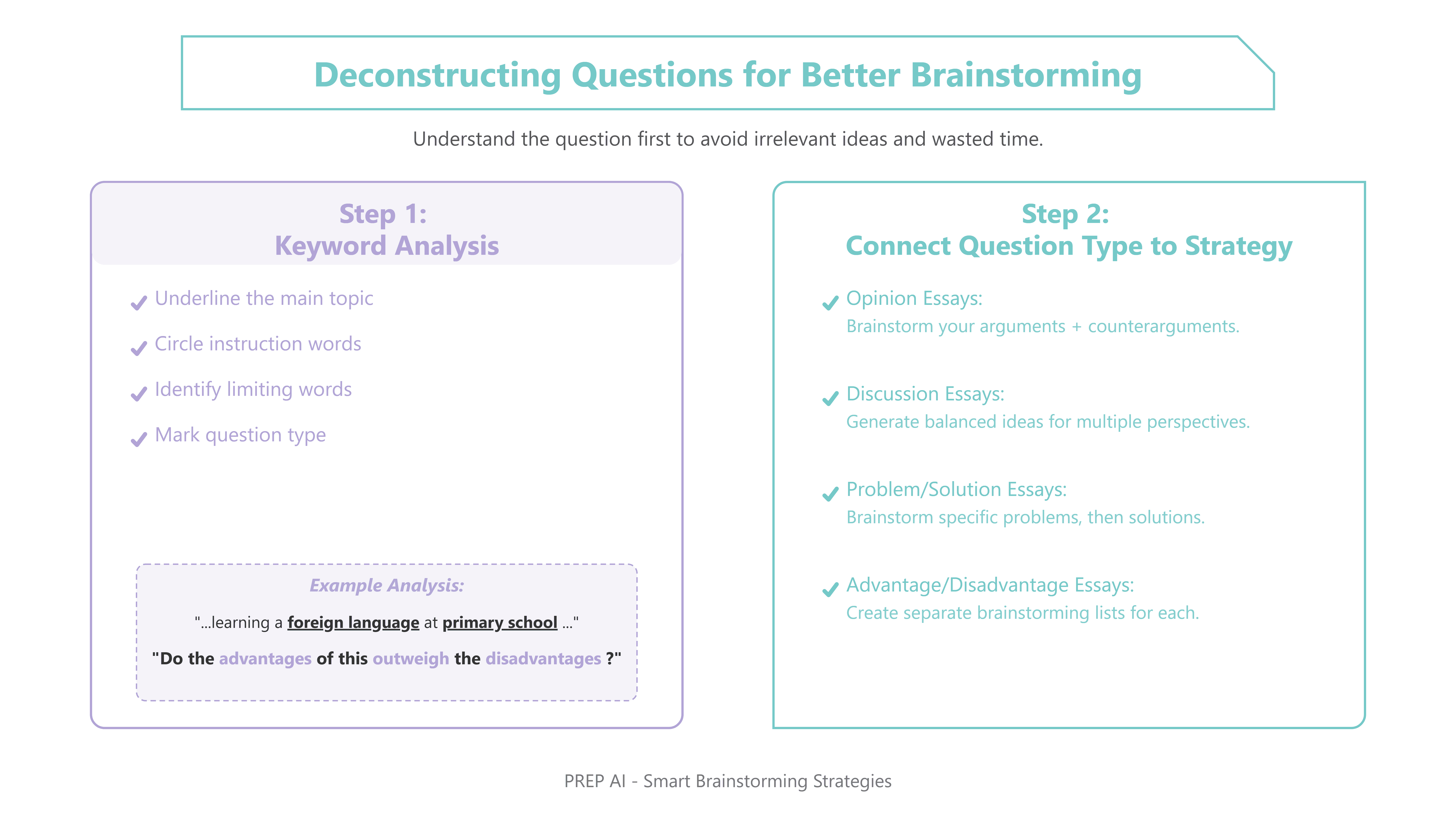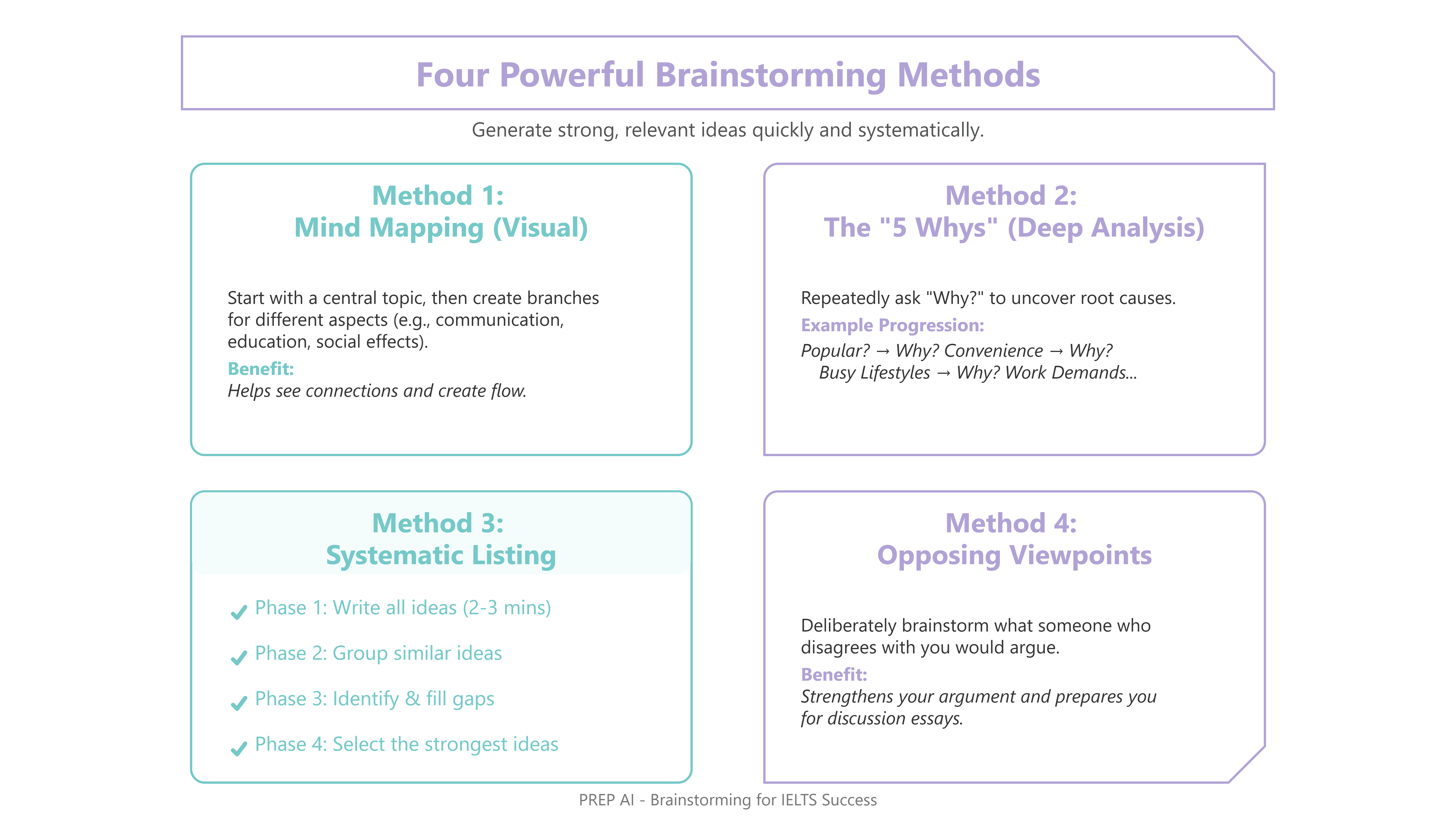Unlock the myths: Brainstorming IELTS Writing Task 2
Mastering brainstorming IELTS Writing Task 2 changes your test experience from overwhelming confusion into confident expression. Many students struggle with generating coherent ideas under pressure, watching precious minutes tick away while their mind remains frustratingly blank. This comprehensive guide reveals proven strategies that turn brainstorming from your biggest weakness into your strongest advantage.
- I. The Brainstorming Barrier: Why It Matters
- II. Deconstructing Questions for Better Brainstorming
- III. Four Powerful Brainstorming Methods That Generate Winning Ideas
- IV. Transforming Brainstormed Ideas into Essay Gold
- V. Mastering Brainstorming Under Time Pressure
- VI. From Brainstorming to High-Scoring Essays: Your Action Plan

I. The Brainstorming Barrier: Why It Matters
Why Bother Brainstorming?
Effective brainstorming IELTS Writing Task 2 serves as the foundation for achieving band scores of 7.0 and above. Students who invest 3-5 minutes in structured idea generation typically produce essays with clearer arguments, stronger evidence, and more coherent organization. The process eliminates the common trap of writing yourself into corners or running out of supporting points halfway through your essay.
Common Brainstorming Roadblocks
Time pressure creates the primary obstacle that prevents students from thinking clearly during the exam. Many candidates feel overwhelmed by broad topics like "technology's impact on society" or struggle to generate personal examples for abstract concepts. These barriers directly impact your ability to brainstorm effectively, making structured techniques essential for success.
II. Deconstructing Questions for Better Brainstorming
Before you can brainstorm effectively, you must understand exactly what the question asks. Poor question analysis leads to irrelevant brainstorming that wastes precious time and generates unusable ideas.

Step 1: Keyword Analysis for Focused Brainstorming
Successful brainstorming IELTS Writing Task 2 begins with precise question analysis that directs your idea generation:
-
Underline the main topic to focus your brainstorming scope
-
Circle instruction words that shape your brainstorming approach
-
Identify limiting words that narrow your idea generation
-
Mark question type to choose appropriate brainstorming methods
Consider this example: "Some people believe that children should start learning a foreign language at primary school rather than secondary school. Do the advantages of this outweigh the disadvantages?" Your brainstorming should focus specifically on "children," "foreign language learning," "primary vs secondary school," and generate ideas about advantages and disadvantages.
Step 2: Connecting Question Types to Brainstorming Strategies
Different essay types require different brainstorming approaches, and understanding this connection improves your idea generation efficiency when learning how to brainstorm ideas for ielts writing task 2:
-
Opinion essays: Brainstorm arguments supporting your position plus counterarguments to address
-
Discussion essays: Generate balanced ideas for multiple perspectives
-
Problem/solution essays: Brainstorm specific problems first, then corresponding solutions
-
Advantage/disadvantage essays: Create separate brainstorming lists for positive and negative aspects
This targeted approach ensures your brainstorming session produces relevant, usable ideas rather than random thoughts about the general topic.
III. Four Powerful Brainstorming Methods That Generate Winning Ideas
Now that you understand how question analysis directs brainstorming, these four proven methods will help you generate strong, relevant ideas quickly and systematically.

Method 1: Mind Mapping for Visual Brainstorming
Mind mapping works particularly well for complex topics where brainstorming IELTS Writing Task 2 requires exploring multiple dimensions. Start with your main topic in the center, then create branches for different aspects. For a technology essay, your branches might include "communication effects," "educational impact," "workplace changes," and "social consequences."
Each branch then generates sub-branches with specific examples and evidence. This visual brainstorming method helps you see connections between ideas that strengthen your arguments and creates natural transitions for your essay structure.
Method 2: The "5 Whys" for Deep Brainstorming
The "5 Whys" technique transforms surface-level brainstorming into profound analysis by repeatedly asking "why" to uncover root causes and fundamental principles. This method particularly enhances brainstorming for problem/solution and cause/effect essays.
Starting with "online learning is becoming popular," your brainstorming progression might look like: Why is it popular? (Convenience) → Why does convenience matter? (Busy lifestyles) → Why are lifestyles busy? (Work demands) → Why do work demands increase? (Economic competition) → Why does this affect education? (People need flexible learning options).
This deep brainstorming approach generates sophisticated arguments that demonstrate critical thinking and lead to higher band scores.
Method 3: Systematic Listing for Organized Brainstorming
Systematic listing and categorizing provides structure for students who think better in organized formats during brainstorming sessions:
-
Phase 1: Write every topic-related idea for 2-3 minutes without editing or judgment
-
Phase 2: Group similar ideas into logical categories (social, economic, environmental, personal)
-
Phase 3: Identify gaps in your brainstorming and generate additional ideas for weak categories
-
Phase 4: Select the strongest 2-3 ideas from your brainstorming that you can develop fully
This systematic brainstorming method works exceptionally well for advantage/disadvantage essays where you need balanced coverage and ensures comprehensive topic exploration.
Method 4: Opposing Viewpoints Brainstorming
Deliberately brainstorming opposing viewpoints strengthens your argument development and prepares you for discussion-type essays. Even for opinion essays, this brainstorming approach demonstrates sophisticated thinking that impresses examiners.
During this brainstorming phase, ask yourself: "What would someone who disagrees with my position argue?" and "How can I respectfully address their concerns while maintaining my stance?" This brainstorming technique helps you anticipate potential weaknesses in your arguments and strengthen them with additional evidence before you start writing.
IV. Transforming Brainstormed Ideas into Essay Gold
Once your brainstorming session generates multiple ideas, you must refine and select the strongest ones. This crucial step connects your brainstorming efforts to actual essay success.
Filtering Brainstormed Ideas for Relevance
After brainstorming IELTS Writing Task 2 ideas, evaluate each potential argument for direct relevance to the specific question asked. Your brainstorming may generate interesting ideas, but only those that directly address the question should make it into your essay. Apply this filter: "Does this brainstormed idea directly answer what the question asks?"
Strengthening Brainstormed Ideas with Evidence
Transform your brainstormed concepts into powerful arguments by identifying specific supporting evidence when you learn how to brainstorm ideas for ielts writing:
Current events that illustrate your brainstormed points Statistical data that supports your brainstormed arguments Expert opinions that validate your brainstormed ideas Personal experiences that make your brainstormed concepts concrete
Strong evidence elevates brainstormed ideas from general statements into compelling arguments that convince examiners of your critical thinking abilities.
Building Logical Connections Between Brainstormed Ideas
Connect your brainstormed ideas into coherent arguments that flow logically from one point to the next. Each brainstormed idea should link to your thesis statement and support your overall position. Practice combining related brainstormed concepts into unified paragraphs that develop single main ideas thoroughly.
V. Mastering Brainstorming Under Time Pressure
Effective time management transforms brainstorming from a luxury into an essential exam strategy that improves your performance within strict time constraints.
The Strategic Brainstorming Timeline
Allocate your brainstorming time strategically within the 40-minute Task 2 limit:
Minutes 1-2: Question analysis and initial brainstorming burst Minutes 3-4: Developing and evaluating brainstormed ideas Minute 5: Organizing brainstormed ideas into essay outline
This structured approach ensures your brainstorming session generates usable ideas without consuming excessive time that should be spent writing and developing your arguments.
Speed Brainstorming Techniques
Practice rapid brainstorming to build mental agility and reduce exam anxiety:
Set strict 3-minute timers for brainstorming sessions with sample questions Challenge yourself to generate 6-8 relevant ideas during each brainstorming practice Focus on quantity during initial brainstorming, then quality during selection phase Practice brainstorming diverse topics to build your knowledge base and response speed
Regular speed brainstorming practice develops the mental reflexes needed to generate ideas quickly under exam pressure.
Connecting Brainstorming to Essay Structure
Transform your brainstorming session directly into your essay outline by organizing generated ideas into introduction, body paragraphs, and conclusion components. This seamless transition from brainstorming to writing maximizes your time efficiency and ensures your brainstormed ideas translate into actual essay content.
VI. From Brainstorming to High-Scoring Essays: Your Action Plan
This systematic checklist connects your brainstorming session to essay success by ensuring every brainstormed idea contributes to your final score.
The Complete Brainstorming-to-Essay Process
-
Question Analysis (2 minutes): Read carefully and identify brainstorming focus areas
-
Active Brainstorming (3 minutes): Generate 6-8 relevant ideas using your chosen method
-
Idea Selection and Thesis Formation (2 minutes): Choose strongest brainstormed ideas and craft thesis
-
Outline Creation (1 minute): Organize brainstormed ideas into essay structure
-
Essay Writing (30 minutes): Develop brainstormed ideas into full arguments
-
Review (2 minutes): Ensure brainstormed ideas were developed completely
Quality Control for Brainstormed Ideas
Before writing, verify that your brainstormed ideas meet these standards:
-
Each brainstormed idea directly addresses the specific question asked
-
You can support each brainstormed concept with concrete evidence or examples
-
Your brainstormed ideas combine into 2-3 strong main arguments
-
All brainstormed content stays within the topic scope and essay type requirements
This quality control process ensures your brainstorming session produces essay-worthy ideas rather than interesting but irrelevant thoughts.
Mastering structured brainstorming IELTS Writing Task 2 techniques transforms your test experience from stressful uncertainty into confident expression of well-organized ideas. The connection between effective brainstorming and high band scores is direct: better brainstorming leads to stronger arguments, clearer organization, and more compelling evidence.
Regular practice with these brainstorming methods builds the mental agility and systematic thinking needed to tackle any brainstorming IELTS Writing Task 2 prompt successfully. Your improved brainstorming skills become the foundation for achieving your target band score and demonstrating your true English language capabilities.

Hi I'm Chloe, and I am currently serving as an Product Content Administrator at Prep Education. With over five years of experience in independent online IELTS study and exam preparation, I am confident in my ability to support learners in achieving their highest possible scores.
Comment
Premium content
View allPersonalized roadmap
Most read












